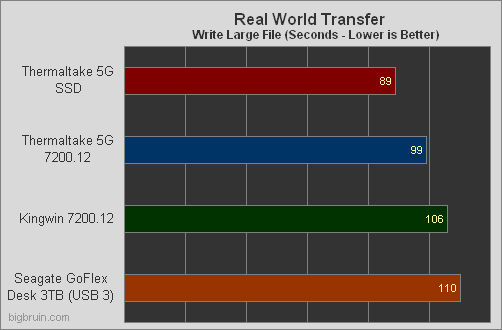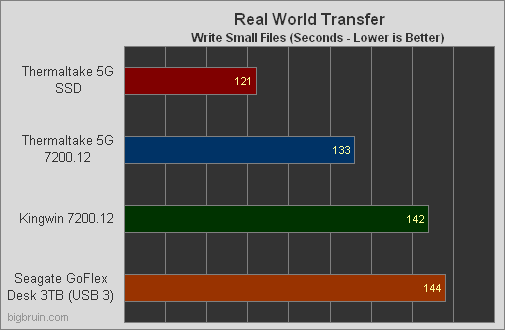Testing:
To test the
Thermaltake BlacX 5G USB 3.0 hard drive docking station, the following base system was used:
» Intel Core 2 Duo E6750 (2.66GHz) processor
» Gigabyte GA-P35C-DS3R motherboard
» eVGA GTX 275 PCIe video card
» Seagate 80GB SATA 3Gbps hard drive
» Seagate 1.5TB SATA 3Gbps hard drive
» Seagate PCI-E 1x USB 3.0 Card
» 4GB OCZ Technology Gold 1333MHz DDR3 memory
» Windows 7 Ultimate 64-bit operating system
The two hard drives used for testing include a Seagate 7200.12 SATA II 1TB hard drive and Kingston SSDNow V+ 128Gb solid state drive.
The Thermaltake BlacX 5G will be tested via a USB 3.0 connection. For further comparison, a Kingwin DockMaster USB 3.0 dock and Seagate GoFlex 3TB USB 3.0 hard drive will be tested.



The following tests will be executed on each configuration to gauge its performance:
» Real World Transfers
» HD Tach 3.0.4.0
Real World Transfers:
To test the real world performance of the
Thermaltake BlacX 5G, two file types were selected. One folder containing 4.5GB of MP3 files (small files), and another 7.3GB ISO (large file) will be used for the test. The speeds will be timed with a stopwatch, which will be started when the mouse button is released to copy the files to the hard drive.
Transferring 7.3GB of data would take a long time over a USB 2.0 connection, however the Thermaltake BlacX 5G transferred it the fastest taking between 89 and 99 seconds. The Kingwin DockMaster was just slightly slower coming in 7 seconds later.

Transferring a smaller number of MP3 files actually takes longer than a single large file. To transfer the 4.5GB of MP3 files, the BlacX 5G took 121 seconds to transfer to the SSD, and 133 seconds to the 7200.12 hard drive. However, the Kingwin DockMaster and the GoFlex Desk took around 10 seconds longer.
